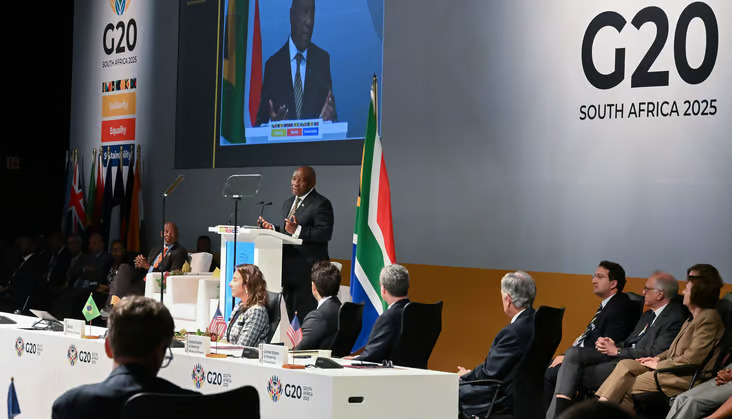South Africa’s G20 Sherpa, Zane Dangor, briefed the United Nations General Assembly plenary on Monday, outlining the country’s key priorities as it prepares to assume the G20 presidency from Dec. 1, 2024, to Nov. 30, 2025.
General Assembly President Philemon Yang emphasized the G20’s role in global development, stating that the group is essential in addressing inequities, mobilizing resources, and securing fairer development lending terms. “As we advance the implementation of the Pact of the Future, the Group of 20 will be critical to ensuring that inequities are addressed, more resources are provided, and better terms for development lending are negotiated,” Yang said.
Li Junhua, U.N. Under-Secretary-General for Economic and Social Affairs and the U.N.’s G20 Sherpa, underscored the group’s influence in climate action. “The G20, as the world’s largest economies, holds a pivotal role in keeping the 1.5-degree temperature rise limit within reach,” he said, adding that South Africa’s presidency presents an opportunity to strengthen collective climate action ahead of COP30.
South Africa has chosen “Solidarity, Equality, Sustainability” as the theme of its G20 leadership. Addressing the plenary, Dangor emphasized the interconnected nature of global challenges and the need for fairness. “Through solidarity, we seek to achieve a future that is people-centered, development-oriented, and inclusive,” he said.
On equality, he stressed the importance of ensuring fair opportunities regardless of economic status, gender, race, or geography. “By advancing equality, we seek to ensure fair treatment, opportunities, and the advancement of all individuals, peoples, and nations,” Dangor said.
Regarding sustainability, he reaffirmed South Africa’s commitment to balancing present needs with future generations. “We will be working to strengthen disaster resilience and responses. We are also focusing on means to ensure debt sustainability for low-income countries,” he said. He noted that high capital costs in Africa and developing nations remain a significant obstacle to growth, and South Africa aims to develop a strategy to address these challenges.
Dangor also highlighted the country’s focus on financing just energy transitions and harnessing critical minerals for sustainable growth. He welcomed the African Union’s inclusion in the G20, calling it an “important opportunity to amplify Africa’s voice in global economic governance.” He stressed that Africa’s development priorities and broader concerns of the Global South must be embedded in the G20 agenda.
The G20, an intergovernmental economic forum of 19 countries and two regional unions—the European Union and, since 2023, the African Union—represents 85% of global GDP, 75% of world trade, and 67% of the global population. With South Africa assuming the presidency, expectations are high for a term focused on inclusivity, sustainability, and equitable global development.

